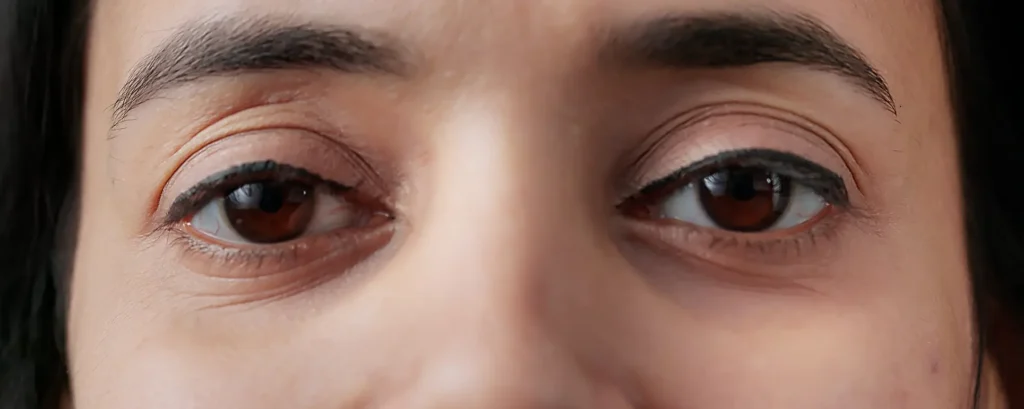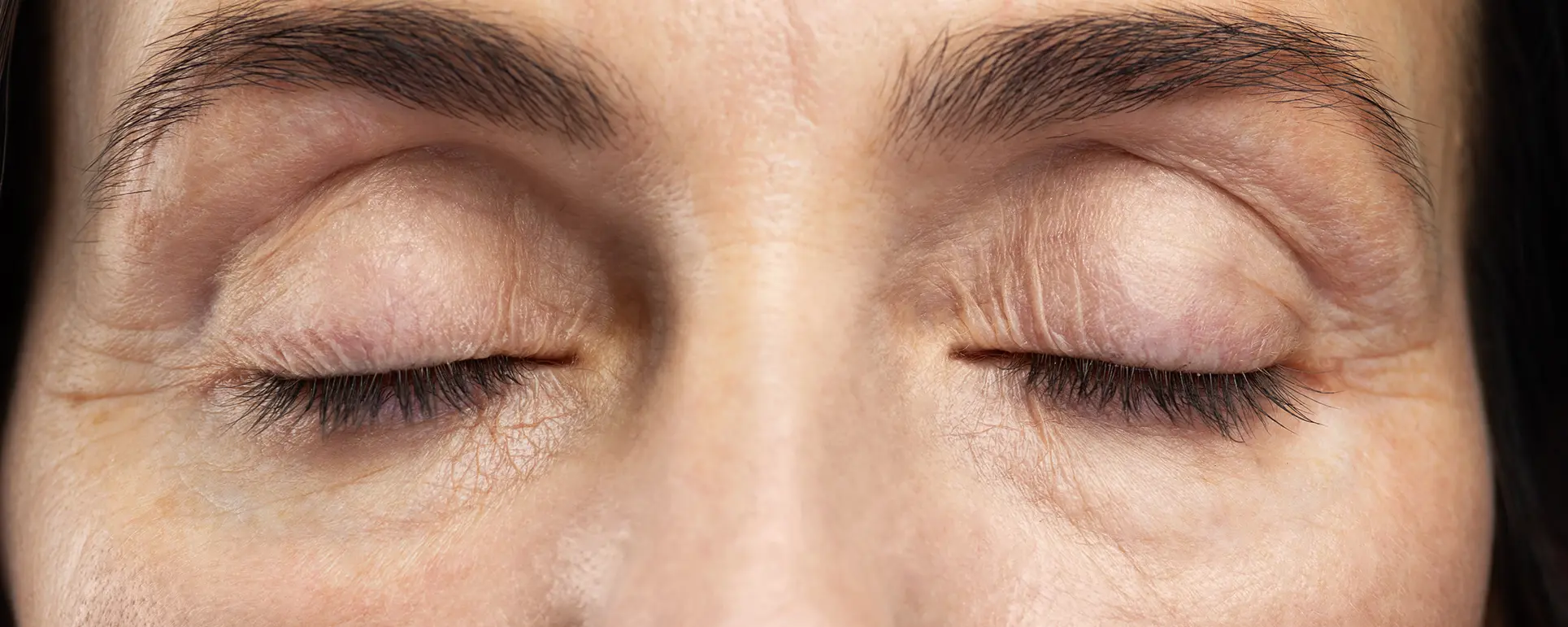Dark eye circles are something almost all of us deal with at some point, and if you’ve ever noticed those shadows under your eyes in the morning, you know how frustrating they can be. They can make you look tired, older, or just worn out, even when you feel perfectly fine. You might wonder: are dark circles something that will just fade away on their own, or are they a permanent issue you’ll have to manage?
The truth is, it really depends on what’s causing them. For some people, lack of sleep or stress might be the main culprit, while for others, genetics, ageing, or even certain lifestyle habits can play a big role. The good news is that you’re not powerless there are steps you can take to reduce the appearance of dark circles and make your eyes look fresher and brighter.
In this article, I’ll take you through the main causes of dark circles, explain how small changes in your daily habits can make a noticeable difference, and highlight some of the most effective treatments that you can try. By the time you finish reading, you’ll have a clear understanding of why dark circles appear, whether they might fade naturally, and exactly what you can do to help your eyes look their best.
What Causes Dark Eye Circles?

Dark circles under your eyes can show up for a variety of reasons, and understanding what’s causing them is the first step in figuring out whether they might fade naturally or need a bit of extra help. Once you know the cause, it’s easier to decide which strategies will actually make a difference.
Lack of Sleep
It might seem obvious, but not getting enough sleep is one of the biggest contributors to dark circles. When you’re sleep-deprived, your skin can look paler, which makes the blood vessels under your eyes stand out more. Because the skin around your eyes is thinner than the rest of your face, even small changes in blood flow can show up as dark circles. So, if you’ve been burning the candle at both ends, your eyes are often the first to show it. Over time, chronic sleep deprivation can make these circles more persistent, even when you finally get rest.
Genetics
Sometimes, dark circles run in the family. If your parents have them, you might be genetically predisposed. In some people, the skin under the eyes naturally has more pigment or thinner skin, making blood vessels more visible. Unfortunately, this means that even with perfect sleep and healthy habits, dark circles can still be noticeable. But knowing this can help you focus on treatments that work for your unique skin type.
Ageing
As you get older, your skin naturally loses fat and collagen, and the area under your eyes becomes thinner. This makes blood vessels more visible and creates shadowing. Combined with reduced elasticity, the area becomes more prone to wrinkles and hollowing, which can make dark circles appear more prominent over time. Luckily, there are ways to boost collagen and plump up this area, which can help soften the shadows.
Allergies
If you suffer from allergies, you may notice swelling or inflammation under your eyes. Constant rubbing or scratching can worsen the issue, causing the delicate skin to darken further. Even seasonal allergies can leave their mark on your under-eye area if they cause irritation. Managing your allergies with medication or avoiding triggers can go a long way in reducing dark circles.
Dehydration
Not drinking enough water can leave your skin looking dull and sunken, especially around your eyes. When your body is dehydrated, dark circles can become more noticeable, making your eyes look tired even if you’ve had enough sleep. Staying properly hydrated throughout the day can help your skin look healthier and brighter.
Sun Exposure
Too much sun can trigger your skin to produce more melanin, which can darken the under-eye area. Over time, excessive sun exposure may make dark circles more pronounced, particularly if you have lighter skin. Using protective measures like sunglasses, hats, and sunscreen can prevent further darkening.
Poor Circulation
If blood doesn’t flow efficiently under your eyes, it can pool in tiny vessels and create that tired, shadowy look. This is often why dark circles are more noticeable in the morning or after long periods of sitting or standing in one position. Gentle facial massage or light exercise can help improve circulation and reduce that heavy, dark appearance.
Can Dark Eye Circles Fade Naturally?

The good news is that in many cases, dark circles can fade naturally if you make a few simple lifestyle changes. For instance, if your dark circles are mainly caused by lack of sleep or temporary fatigue, improving your sleep habits can make a real difference. However, it’s important to remember that for some people especially those with genetic factors or pigmentation issues dark circles may not disappear completely on their own, and additional treatments may be needed.
Sleep and Rest
Getting adequate sleep is one of the simplest and most effective ways to fight dark circles. When you sleep, your body goes through a natural repair process, which includes restoring skin health and reducing inflammation. A good night’s rest allows your body to recharge, and over time, this can lead to noticeable improvements in how your under-eye area looks. If you make sleep a priority, you may also notice other benefits, like brighter eyes and a fresher overall appearance.
Hydration
Drinking plenty of water is essential for maintaining your skin’s hydration and preventing that dull, sunken look that dehydration can cause. Keeping your body well-hydrated supports your skin’s elasticity, helps flush out toxins, and can improve circulation under your eyes. When your skin is properly nourished with water, dark circles may appear less pronounced, giving your face a more awake and refreshed look.
Elevating Your Head While Sleeping
If fluid retention is contributing to your dark circles, sleeping with your head slightly elevated on an extra pillow can help. This simple trick prevents fluid from pooling under your eyes, which can reduce both puffiness and the dark appearance. Over time, combining this with other healthy habits like proper sleep and hydration can make a noticeable difference in how tired your eyes look in the morning.
Effective Treatments for Dark Eye Circles
If lifestyle changes alone aren’t enough, don’t worry you still have several effective options to reduce or even eliminate dark circles. From simple at-home remedies to professional treatments, there’s something for every budget and concern. The key is to find the right approach for your specific type of dark circles and skin needs.
Topical Creams and Serums
There are many over-the-counter creams and serums designed specifically to treat dark circles, and choosing the right ingredients can make a noticeable difference. Look for products that contain:
- Caffeine: Helps reduce puffiness by improving circulation and temporarily tightening the skin.
- Retinol: Stimulates collagen production, thickening the delicate under-eye skin and reducing shadowing.
- Vitamin C: Brightens the skin and combats pigmentation, giving a more even tone.
- Hyaluronic Acid: Deeply hydrates and plumps the skin, making dark circles less visible.
Using these consistently over time can help improve the appearance of your under-eye area, but remember that results may take several weeks to become noticeable.
Cold Compresses
Applying a cold compress to your under-eye area is a quick and easy way to reduce puffiness and temporarily lighten dark circles. The cold helps constrict blood vessels, which can minimize swelling and make shadows less noticeable. You can use a chilled cloth, ice packs, or even spoons kept in the fridge for a few minutes each morning. This simple routine can be particularly effective if your dark circles are worsened by fluid retention or tiredness.
Chemical Peels and Laser Treatments
For more stubborn dark circles, especially those caused by pigmentation or thinning skin, professional treatments may be the most effective solution. Chemical peels remove the top layer of skin, encouraging the growth of fresh, healthy skin cells and improving overall tone. Laser treatments work by stimulating collagen production and enhancing skin elasticity, which can reduce the appearance of shadows and fine lines.
These procedures should always be performed by a qualified dermatologist, who can assess your skin type and recommend the best approach for your needs. With professional guidance, you can achieve longer-lasting results and a more refreshed under-eye appearance.
Lifestyle Changes to Prevent Dark Circles
Prevention is always better than cure, and making a few simple lifestyle changes can go a long way in reducing the chances of dark circles forming in the future. By taking care of your body and skin, you’re not only protecting your under-eye area but also supporting your overall health. Here are some steps you can easily incorporate into your daily routine:
- Get adequate sleep (7–9 hours a night): Quality sleep allows your body to repair itself, including restoring skin health and reducing inflammation. When you make sleep a priority, you’ll notice your eyes look brighter and more refreshed.
- Eat a balanced diet rich in antioxidants, vitamins, and minerals: Nutrient-rich foods help maintain healthy skin and improve circulation, which can reduce dark circles over time. Including plenty of fruits, vegetables, and whole grains in your meals supports your skin from the inside out.
- Wear sunscreen every day to protect your skin from UV damage: Sun exposure can increase pigmentation and make dark circles more noticeable. Applying sunscreen daily helps prevent further darkening and keeps your skin looking youthful and healthy.
- Avoid smoking and excessive alcohol: Both habits can contribute to dehydration and premature skin ageing, making dark circles more visible. By reducing or eliminating these, you’ll help your skin retain moisture and appear more radiant.
- Manage stress with relaxation techniques: Stress can affect your sleep, circulation, and overall skin health, all of which can worsen dark circles. Incorporating activities like meditation, yoga, or deep breathing exercises into your day can help you feel calmer while also benefiting your under-eye area.
FAQs about Dark Eye Circles:
1. What causes dark eye circles?
Dark eye circles are caused by multiple factors, such as genetics, lack of sleep, age, allergies, and sun exposure. The skin under the eyes is thin, and when blood vessels dilate or when there’s a buildup of pigment, they become more visible, giving the appearance of dark circles. Additionally, aging can cause skin to lose its elasticity and become thinner, making dark circles more pronounced.
2. Do dark eye circles go away on their own?
Dark eye circles may fade naturally with lifestyle changes, such as getting enough sleep and staying hydrated. However, if they are caused by genetics or ageing, they may not completely disappear without intervention. In these cases, treatments like topical creams, laser therapy, or dermal fillers may be more effective in reducing their appearance
3. What treatments are available for dark eye circles?
Treatments for dark eye circles include topical creams containing caffeine, retinol, or vitamin C, which help brighten and firm the skin. Cold compresses can temporarily reduce puffiness, while professional treatments like chemical peels and laser therapy address pigmentation and skin thinning. For deeper issues, dermal fillers can restore volume and reduce shadows under the eyes.
4. Can dark eye circles be prevented?
While you can’t completely prevent dark circles, maintaining a healthy lifestyle can reduce their severity. Ensuring adequate sleep, staying hydrated, and using sunscreen can prevent many of the common triggers. Managing stress and avoiding rubbing your eyes also helps prevent irritation and inflammation that can worsen dark circles.
5. Are there any home remedies that work for dark eye circles?
Home remedies, such as placing cucumber slices or chilled tea bags over the eyes, can provide temporary relief by reducing swelling and cooling the area. Almond oil may also help lighten dark circles over time. While these remedies offer quick fixes, they are unlikely to completely eliminate dark circles, especially if they are caused by factors like genetics or ageing.
6. Can dark eye circles be caused by allergies?
Yes, allergies can contribute to dark circles. When your body reacts to allergens, it triggers inflammation and swelling in the skin around the eyes, which makes dark circles more prominent. Allergies can also cause you to rub or scratch your eyes, further irritating the skin and exacerbating the appearance of dark circles.
7. Are dark eye circles a sign of an underlying health condition?
Dark eye circles can sometimes indicate an underlying health issue, such as anemia, thyroid problems, or dehydration. If you experience persistent dark circles along with other symptoms like fatigue, weight changes, or puffiness, it’s worth consulting a healthcare professional to rule out any medical conditions.
8. Can dark eye circles be a sign of ageing?
As you age, the skin naturally becomes thinner and loses fat and collagen, making blood vessels under the eyes more visible. This thinning of the skin can lead to the appearance of dark circles. The loss of volume in the under-eye area can also cause shadows that make dark circles more noticeable.
9. How long does it take for treatments to show results?
The time it takes to see results varies depending on the treatment. Topical treatments can take a few weeks to show improvement, while professional treatments like laser therapy and fillers can deliver quicker, more noticeable results. Fillers often provide immediate results, but other treatments may require a few weeks to show full effects.
10. When should I see a dermatologist for dark eye circles?
If your dark circles persist despite trying lifestyle changes or over-the-counter remedies, or if they are associated with other symptoms, it’s a good idea to consult a dermatologist. A dermatologist can assess whether the dark circles are caused by a medical condition and recommend appropriate treatments, including professional options like laser therapy, chemical peels, or fillers.
Final Thoughts: Managing Dark Circles Under Your Eyes
Dark eye circles can be caused by various factors, from genetics and ageing to sleep deprivation and environmental triggers. While they may fade naturally in some cases, for many people, treatments like topical creams, cold compresses, and professional procedures offer more noticeable and lasting results.
At the London Dermatology Centre, we understand how challenging dark circles can be, and our team is here to help. If you’re looking for more effective solutions, you can visit our dark circles under eyes page to learn more about treatment options and book a consultation.
References:
1. Vrcek, I., & Rallis, M. (2016). Infraorbital Dark Circles: A Review of the Pathogenesis, Evaluation, and Management. Journal of Clinical and Aesthetic Dermatology, 9(11), 22–29.
2. Goldman, A. et al. Periorbital Hyperpigmentation Dark Circles under the Eyes. Cosmetics (MDPI), 2021. Full text:
3. Park, K. Y., & Lee, S. J. (2018). Treatments of Infra-Orbital Dark Circles by Various Etiologies. Annals of Dermatology, 30(5), 522–528.
4. Mac-Mary, S., & Dreno, B. (2019). Identification of Three Key Factors Contributing to the Occurrence of Infraorbital Dark Circles. Journal of Cutaneous and Aesthetic Surgery, 12(1), 28–34.
5. Ahn, I., & Lee, J. H. (2019). Do Dark Circles under the Eyes Predict Health Status? International Journal of Clinical and Experimental Medicine, 12(5), 3573–3578.
